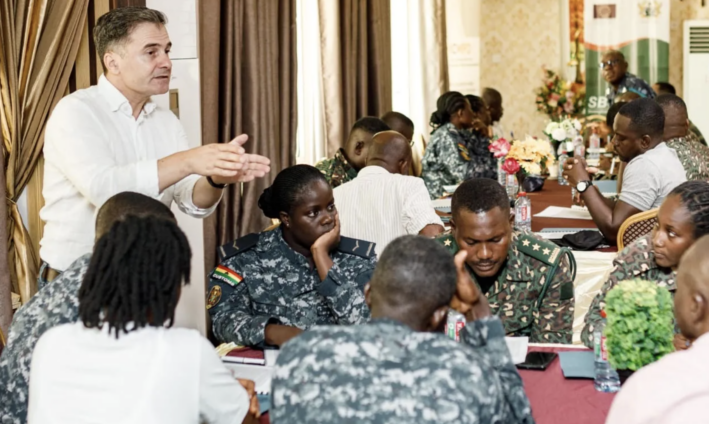The International Centre for Migration Policy Development (ICMPD) Ghana has provided training on the concept and practice of Joint Mobile Teams (JMT) for border security agencies.
The training, held in Elubo and Akanu in the Western and Volta regions, respectively, were part of the Strengthening Border Security (SBS) Project in Ghana.
The workshops are also part of a larger effort of developing, piloting, and validating the Concept and Standard Operating Procedures (SOPs) for the functioning of JMTs in Ghana.
This is a novel strategy that ICMPD is proposing in the framework of the SBS project, a statement issued by the group and copied the Ghana News Agency said, in Accra.
There were more than 70 participants and national experts from various border management agencies, including the Ghana Immigration Service (GIS), Ghana Revenue Authority - Customs Division (GRA-CD), National Intelligence Bureau (NIB), Narcotics Control Commission (NACOC) and the Ghana Police Service (GPS).
This was to improve their ability to function effectively in tackling cross-border crimes, particularly, migrant smuggling, human trafficking, and the threat of insecurity and terrorism.
Speaking at the event, Ms. Iulia Jolley-Socea, Project Manager, Strengthening Border Security in Ghana Project, said the development of Joint Mobile Teams (JMT) was a crucial strategy to improve coordination among key border management agencies in Ghana.
“By bringing together the expertise and resources of multiple security agencies, JMTs enable the agencies to confront border challenges with agility, effectiveness, and unity of purpose through coordinated patrols, intelligence-sharing, and rapid response capabilities.
“This empowers them to proactively address threats at the earliest opportunity, safeguarding Ghana’s borders and communities,” she said.
Mr. Tony Mihaitoaia, Border Management Specialist at ICMPD, explained that joint mobile teams promoted interagency cooperation and built trust among participating stakeholders.
“This collaborative approach fosters a shared understanding of common goals and challenges, facilitating smoother operations and communication,” he said.
He added that: “Mobile teams can also leverage community engagement in border areas to gather valuable intelligence and build strong relationships with local stakeholders.”
In Elubo and Akanu, participants were introduced to the JMT Concept and SOPs, which provide a framework for joint operations, information sharing, and collaborative efforts in securing Ghana’s borders.
The facilitation team also shared valuable insights into key topics such as human rights in border management, situational awareness, and identifying and addressing trafficking in human beings during JMT operations.
Additionally, they engaged in interactive scenario-based training and planning exercises as well as field simulation exercises, practicing complex border security scenarios in a hands-on and interactive manner to enhance their response skills and coordination.
Two similar workshops were organised in 2022 and 2023 in the North of Ghana.
Through a constructive review process, the security personnel reflected on and assessed their performances, identified lessons learned, and provided feedback on the JMT SOPs.
The border agencies also gathered valuable insights and best practices and offered constructive suggestions for refining the JMT framework.
The SBS Project in Ghana is a joint initiative between ICMPD and GIS, funded by the European Union’s Emergency Funding for Africa.
This collaborative project seeks to enhance the capacity of Ghana’s border security agencies, ensuring their long-term sustainability and adherence to human rights and the rule of law.
By implementing initiatives such as the JMT piloting, the project showcases ICMPD’s dedication to strengthening Ghana’s border management.
The ICMPD is an international organization with 20-Member States and 498 staff members. Active in more than 90 countries worldwide, it takes a regional approach in its work to create efficient cooperation and partnerships along migration routes.
Priority regions include Africa, Eastern Europe, Central Asia, Mediterranean, Silk Routes, Western Balkans and Türkiye.
The SBS Ghana project is a comprehensive initiative aimed at enhancing the country’s border security and migration management.
In line with government’s migration policy, SBS Ghana strives to implement a forward-thinking and sustainable migration management framework that drives national progress and prosperity.
The project is designed to strengthen cooperation and coordination among national agencies, academic institutions, and civil society organisations working in the area of migration.
Latest Stories
-
Police launch raid on illegal miners in Asenanyo Forest Reserve
2 minutes -
Justice Ackaah-Boafo condemns ‘mob justice’, urges faith in Ghana’s legal system
5 minutes -
Keep Supreme Court retirement age at 70 – Justice Ackaah-Boafo urges
17 minutes -
Mr. Mike Eghan
18 minutes -
Mr Kofi Amponsah-Efah
23 minutes -
Judges must be AI literate – Justice Ackaah-Boafo
27 minutes -
Mrs. Victoria Ama Serwah Arthur
40 minutes -
Equater Energy to launch BuyPower Gh app on July 1
50 minutes -
KMA restricts street trading, enhances traffic regulations as Kumasi welcomes Eswatini King
55 minutes -
Yellow Card partners with Visa to accelerate stablecoin adoption across emerging economies
58 minutes -
Ghana’s Mathematics team excels at 2025 Pan African Olympiad
1 hour -
One dead, 4 injured in multi-vehicle crash on Cape Coast–Takoradi–Accra highway
1 hour -
AG’s public statements don’t influence judicial rulings – Justice Ackaah-Boafo
1 hour -
Justice Ackaah-Boafo: Ghana needs more lawyers to match justice system’s demand
2 hours -
Six new Adinkra symbols unveiled to signify Asantehene’s unparalleled leadership
2 hours

